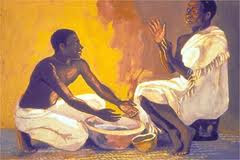From a treatise on John by Saint Augustine, bishop
| The new commandment |
|---|
The Lord Jesus declares that he is giving his disciples a new commandment, that they should love one another: I give you a new commandment: love one another.
But wasn’t this commandment already part of the ancient law of God, where it is written You shall love your neighbor as yourself? Why, then, is it called a new one by the Lord, when it is really so old? Is it new because he has divested us of our old humanity and clothed us with the new? It is true that love renews those who listen to it (or rather, those who act in obedience to it) but it is that particular love which the Lord distinguished from all carnal affection by adding love one another as I have loved you.
 This is the love that renews us, making us new men, heirs of the New Testament, singers of the new song. It was this love, my beloved brethren, that renewed the patriarchs and prophets of old, and later renewed the blessed apostles. This is the love that is now renewing the nations, and from among the universal race of man, which overspreads the whole world, is making and gathering together a new people, the body of the newly-married spouse of the only-begotten Son of God. Of her the Song of Songs says, Who is she who is coming up, clothed in white? Clothed in white because she has been renewed; and how else can she have been renewed but by the new commandment?
This is the love that renews us, making us new men, heirs of the New Testament, singers of the new song. It was this love, my beloved brethren, that renewed the patriarchs and prophets of old, and later renewed the blessed apostles. This is the love that is now renewing the nations, and from among the universal race of man, which overspreads the whole world, is making and gathering together a new people, the body of the newly-married spouse of the only-begotten Son of God. Of her the Song of Songs says, Who is she who is coming up, clothed in white? Clothed in white because she has been renewed; and how else can she have been renewed but by the new commandment? Because of this, the members of the people of God have a mutual interest in one another; and if one member suffers then all the members suffer with it; and if one member is honored then all the members rejoice with it. For this they hear and this they observe: I give you a new commandment: love one another: not as people who pretend to love in order to corrupt one another, nor indeed as people love one another genuinely but in a human way. Rather, they love one another as those who belong to God. All of them are children of the Most High and consequently brethren of his only Son. They share with each other the love with which he leads them to the end that will bring them fulfillment and the true satisfaction of their real desires. For when God is all in all, there is no desire that is unfulfilled.
This love is bestowed on us by him who said, Just as I have loved you, you also must love one another. He loved us so that we should love one another. By loving us he bound us to one another in mutual love, and by this gentle bond united us into the body of which he is the most noble Head.


No comments:
Post a Comment
Note: Only a member of this blog may post a comment.